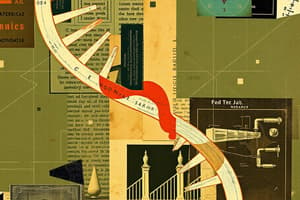Podcast
Questions and Answers
Which of the following best describes the primary focus of single loop learning?
Which of the following best describes the primary focus of single loop learning?
- Correcting actions within existing routines to achieve desired outcomes (correct)
- Challenging underlying assumptions and beliefs
- Promoting transformative change and innovation
- Adapting quickly to complex, changing conditions
Double loop learning is primarily useful in stable environments with clear, unchanging goals.
Double loop learning is primarily useful in stable environments with clear, unchanging goals.
False (B)
In the context of organizational learning, what is the main difference between single-loop and double-loop learning regarding the questioning of norms?
In the context of organizational learning, what is the main difference between single-loop and double-loop learning regarding the questioning of norms?
Single-loop learning accepts existing norms while double-loop learning questions norms.
Match the learning type with its corresponding action:
Match the learning type with its corresponding action:
Which of the following is a key limitation of single loop learning?
Which of the following is a key limitation of single loop learning?
Single loop learning involves questioning the values and beliefs that drive behavior and decision-making.
Single loop learning involves questioning the values and beliefs that drive behavior and decision-making.
What is one benefit of double loop learning compared to single loop learning?
What is one benefit of double loop learning compared to single loop learning?
While single-loop learning maintains the ____ ____, double-loop learning leads to paradigm shifts.
While single-loop learning maintains the ____ ____, double-loop learning leads to paradigm shifts.
In what type of environment is double loop learning best applied?
In what type of environment is double loop learning best applied?
Flashcards
Single Loop Learning
Single Loop Learning
Focuses on efficiency by correcting actions within existing routines to achieve desired outcomes, like a thermostat.
Double Loop Learning
Double Loop Learning
Addresses deeper issues and fosters adaptability by questioning underlying assumptions, beliefs, and values.
Action (Single Loop)
Action (Single Loop)
Adjusting behavior to align with a specific aim within the current framework.
Goal (Single Loop)
Goal (Single Loop)
Signup and view all the flashcards
Single Loop Characteristics
Single Loop Characteristics
Signup and view all the flashcards
Double Loop Characteristics
Double Loop Characteristics
Signup and view all the flashcards
Deep Dive (Double Loop)
Deep Dive (Double Loop)
Signup and view all the flashcards
Applying Double Loop
Applying Double Loop
Signup and view all the flashcards
Resilient (Double Loop)
Resilient (Double Loop)
Signup and view all the flashcards
Study Notes
- Single and double loop learning concepts and applications facilitate adaptation and innovation
- Essential learning strategies equip you to master change
Introduction to Single Loop Learning
- Single loop learning corrects actions within existing routines, focusing on efficiency
- Actions get modified to achieve desired outcomes, similar to how a thermostat adjusts temperature
- The goal is to adjust behavior to meet the existing standards
- An example is adjusting a thermostat to make a room warmer without changing the specific temperature setting
The Limits of Single Loop Learning
- Single loop learning is limited, as it cannot address underlying issues and may reinforce existing assumptions
- It can be ineffective for complex problems
- Single Loop learning is superficial, failing to address core issues, rigid, reinforcing existing routines, simple, and ineffective for complex problems
Application of Single Loop Learning
- Single loop learning is useful in stable environments for routine tasks and process optimization
- Ideal for clear and unchanging goals and quick, immediate improvements
- Identify the problem, adjust action, and achieve goals
Introduction to Double Loop Learning
- Double loop learning emphasizes deeper understanding of underlying assumptions, beliefs, and values that drive behavior and decision-making within organizational learning and systems thinking
Double Loop
- Double loop learning addresses deeper issues and fosters adaptability and resilience
- It enables organizations to adapt to complex, changing conditions and thrive
- Characteristics include addressing core issues and values, adaptability and resilience
- It helps organizations thrive, such as questioning why the thermostat was set to a specific temperature and considering factors like energy efficiency or comfort to redefine the standard
Applying Double Loop Learning
- Apply it in dynamic environments for strategic changes and cultural shifts
- Use when existing approaches fail and encourage experimentation and feedback
- Question norms, reflect on values, and experiment
Single vs. Double Loop Learning Strategies
- Correcting room temperature using a thermostat represents single loop learning, while changing company mission is double loop learning
- Integrate both
- Single loop learning is corrective action focused on efficiency
- It's effective for routine problems or when the existing framework is sound
- Double loop learning is transformative change that rethinks assumptions
- It's necessary for addressing systemic issues, adapting to change, and fostering innovation
Key Differences
- Single-loop learning fixes errors within the current system, while double-loop learning challenges and redefines the system
- Single-loop learning involves incremental improvements, while double-loop learning involves transformative or fundamental change
- Single-loop accepts existing assumptions and maintains the status quo with adjustments, while double-loop learning questions and revises assumptions and leads to innovation and paradigm shifts
Key Takeaways and Next Steps
- Single loop enhances existing processes, while double loop drives innovation
- Integrate both for optimal results and embrace continuous learning and adaptation
- Innovate, Adapt and Transform
Studying That Suits You
Use AI to generate personalized quizzes and flashcards to suit your learning preferences.




